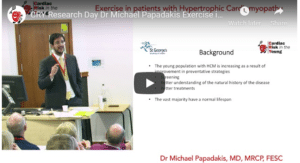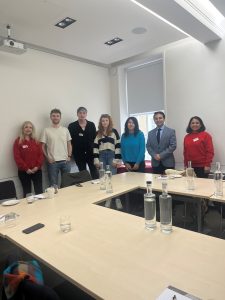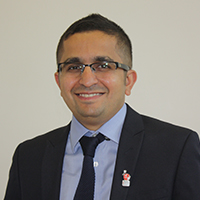
Interview with Dr Harshil Dhutia (Consultant cardiologist, Glenfield Hospital Leicester & Clinical Lead for the Inherited Cardiac Conditions service, University Hospitals of Leicester):
CRY’s Research Fellows – both past and present – are playing an increasing role in helping to inform and influence decision makers, based on their highly acclaimed, published research papers and the findings they present at UK and international conferences.
And, with the prospect of further reviews by the National Screening Committee (NSC) on the horizon – coupled with a renewed energy behind CRY’s campaigning and public affairs activity across all the Home Nations – the importance of sharing and profiling research into the accuracy, outcomes and cost-efficiencies of CRY’s cardiac screening programme has never been more important and topical.
It therefore feels very timely this month to be shining a light on the research highlights of Dr Harshil Dhutia, whose work has been submitted as important evidence to decision-making panels in the past – and is likely to be considered as part of an updated round of reviews.
As well as championing the campaign (and acknowledging current challenges) for wider access to screenings (for both athletes and the general population), in this article he also raises some concerns about the lack of formal training for cardiology trainees in the identification and management of arrhythmias in young people, thanking CRY for the way it helps to ‘fill this gap’ through its research fellowship programme.
Dr Dhutia was appointed as a CRY-funded Research Fellow from 2013-2016 and now, as a Consultant Cardiologist, has gone on to ‘head up’ a new Inherited Cardiac Conditions (ICC) Centre at the University Hospitals Leicester, taking the specialist training and expertise he acquired whilst working with Professor Sanjay Sharma in London onto this important and leading cardiac unit in the Midlands (underpinning the ‘regional ethos’ of CRY’s Research Fellow programme).
So, here, we chat to Dr Dhutia to find out more about his pivotal projects and the potential impact and practical application of these findings on the ongoing development and refinement of CRY’s cardiac screening programme.
Finally, Dr Dhutia (who also explains his ongoing involvement with complex cases under discussion in the Multi-Disciplinary Team at St George’s Hospital, London) shares with us some of the lessons he learnt from being part of CRY’s pioneering cardiac screening programme and how he’s using his experience to support a local Leicestershire charity which is also committed to the prevention of young sudden cardiac death (YSCD).
Firstly Dr Dhutia, this feels like a very timely opportunity to look back and review the research highlights which were a direct result of your 3-year Fellowship with Cardiac Risk in the Young (CRY)
Can we start by talking through the focus and objectives of a specific piece of published research which you led on during your time as a Research Fellow [Diagnostic yield and financial implications of a nationwide electrocardiographic screening programme to detect cardiac disease in the young] and explain why you chose to focus on ‘general population screening’?
“So, basically, most of the research – and indeed the practice of pre-participation screening – at the time had focussed exclusively on competitive sport, particularly in those participating at the highest echelons. However, it is recognised that the conditions that cause YSCD are often genetic, and therefore do not have a unique predilection for competitive sport.
“As such, there was a clear ethical issue developing around access and equitable care with regards to screening.
“There was also limited information on the role of screening with electrocardiography (ECG) in identifying cardiac diseases associated with sudden cardiac death (SCD) in a non-select group of adolescents and young adults in the general population. But of course, CRY had a well-established nationwide screening programme outside competitive sport, so were able to use this valuable and unique data to:
- Establish the prevalence of conditions associated with YSCD detected through a nationwide cardiac screening programme.
- Consider the most effective method to identify individuals with conditions associated with YSCD (essentially compare ECG screening vs. the current standard of care including symptoms and a ‘family history’ driven investigation).
- Investigate the impact of a diagnosis (made through screening) on condition management and the treatments delivered.
- Report the cost implications of a nationwide cardiovascular screening programme – which until this time had never been investigated previously.
So, what were the main findings of this research and how do you think your conclusions might positively impact CRY’s pioneering screening programme?
“This was the first study to report the results of an electrocardiogram (ECG) based cardiovascular screening programme in the young general population at a nationwide level and provided compelling evidence about the efficacy and cost-efficiencies of proactive cardiac testing which should be used to inform health policy to help safeguard young lives.”
The key findings included:
- The prevalence of cardiovascular disease associated with young sudden cardiac death in the general population is 0.3%.
- The cost of electrocardiogram-based cardiovascular screening in 2018 was €97 (£86) per person screened, €17 834 (£15,752) per cardiovascular disease detected and €29 588 (£26,184) per cardiovascular disease associated with sudden cardiac death detected.
- 81% of individuals identified with cardiovascular disease associated with SCD were asymptomatic with a normal family history and were identified solely on the basis of an abnormal ECG.
Inclusion of an electrocardiogram (ECG) to the current, standard practice of symptom and family history driven evaluation increases the diagnostic yield for serious cardiac disease by five-fold and is associated with a 36% reduction in cost per disease detected.
- Most young individuals identified with serious cardiac disease (including those who are asymptomatic and have no worrying family history) received disease modifying therapy within 2 years of having been diagnosed through screening.
This impact and ‘follow up’ had never been studied and evaluated before which, in my opinion, works as a potential rebuttal to ‘screening critics’ who in the past have suggested that the true impact (both physically and psychologically) of screening and identifying young people is not known or published – which is simply not true.
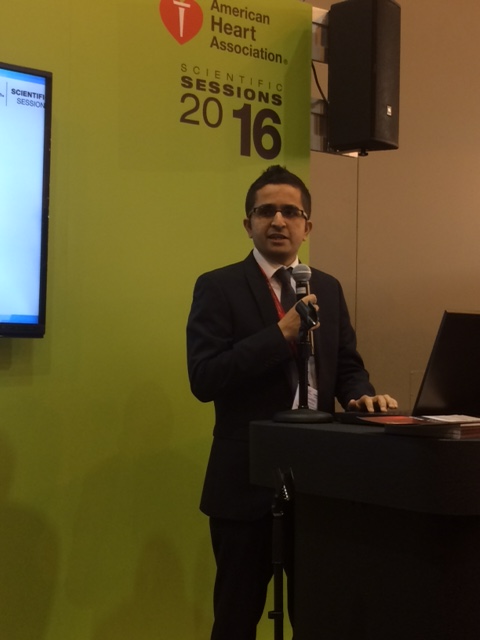
And, how would you like to see the knowledge gained from this research ‘rolled out’
“Although the NHS / National Service Framework (NSF) Chapter 8 in the UK acknowledges the importance of identifying all young individuals at risk of SCD, cardiovascular evaluation is reserved for the minority with symptoms or a family history of cardiovascular disease or even the sudden cardiac death of a relative. Our findings in this large general population study of young individuals demonstrated that such a health-care policy is counter-intuitive for disease detection and is actually more expensive.
“So, if the identification of all young individuals at risk of SCD is an important public health concern (as would be expected by development of an NSF), then routine inclusion of the ECG in evaluations appears to be the most effective way to identify associated conditions. Furthermore, early detection results in implementation of prognostic medical intervention in the majority of cases i.e. the opportunity to treat people prior to developing symptoms or suffering a cardiac arrest.
“That said (and particularly right now with the financial pressures faced by the NHS) the cost implications of screening at nationwide level would need to be considered and may be prohibitive in its current state, considering the huge number of young people who are eligible for screening.
“But this does not mean we shouldn’t be looking at alternative ways to try to mitigate some of these costs. For example;
- centralising screening in regional hubs to help reduce expenditure;
- ensuring all those who are carrying out screening are highly trained in the interpretation of ECGs;
- developing a more streamlined and structured follow up programme post-screening
- and, as technology moves apace, using Artificial Intelligence (AI) to accurately and rapidly read ECGs, would significantly cut costs and increase capacity.
“There hasn’t been a mass ECG study into AI capability as yet, but I do believe – that in time and with refinement to sort out the current flaws – this is the future to being able to potentially roll out population wide cardiac screening. It could be a real game changer.”
Importantly, in your opinion, how could this research potentially influence the next screening review due to be carried out by the National Screening Committee?
“I’m very proud that my research formed part of the evidence submitted to the last National Screening Committee review in 2019, where we concluded that the ECG is a valid and reliable screening test that significantly improves the detection rate of hidden heart conditions in young people, in the general population.
“So, I’m really hopeful that my most recent studies will help to further inform the next round of reviews by the NSC. We do need to see more published research on the rate of so-called ‘false negatives’ – but again, I’m confident that we will see this data (based on analysis of intelligence from the ONS) published soon.
“In my opinion, this could really help to influence key decision makers, coupled with our important findings of how we treat, follow-up and positively monitor those identified with a condition through screening.
“And, again in my opinion, I don’t believe the 2019 NSC panel took into consideration the vital role of proactive screening in identifying ‘more than one’ person with a condition.
“By this I mean, if you diagnose an asymptomatic young person with a potentially inherited condition, there’s a high chance (up to 50%) of other relatives (parents, young siblings or cousins) also being at risk of SCD from the same condition. There’s no doubt that this is a hugely significant (and not to be ignored) benefit of a national screening programme for ‘apparently healthy’ young people.”
Another of your previous studies [Inter-Rater Reliability and Downstream Financial Implications of Electrocardiography Screening in Young Athletes] talked about the importance of physicians being appropriately trained in the interpretation of ECGs, which is something CRY is currently campaigning about and plans to bring to the attention of the NSC / DHSC.
Are you able to summarise the key findings from that piece of research?
“It’s well established that the addition of the ECG (particularly in athletes) to a health questionnaire and physical examination within the screening protocol improves sensitivity to detect serious cardiac disease. That has consistently been shown in many studies.
“However, a concern around the ECG as a ‘screening tool’ relates to the potential for variation in interpretation especially in less experienced hands. So, in this study we looked at the interpretation ‘skills’ and ensuing results when doctors were asked to comment anonymously on ECG tracings of a cohort of athletes, and interestingly we found that:
- there is only moderate inter-observer reliability for ECG interpretation even among cardiologists with experience in the cardiovascular evaluation of young athletes.
- however, modification of ECG interpretation criteria (including the model developed through CRY-funded research) improves reliability especially among non-sports cardiologists.
- the decision to propose secondary investigations after ECG interpretation varies among sports and non-sports cardiologists respectively, with significant downstream financial implications.
- the take-home message from the findings of this study highlights that formal training and development of standardised diagnostic pathways are essential to support cardiologists involved in cardiac screening of young athletes (such as the highly acclaimed Sports Cardiology MSc course now being run at St George’s, University of London,)).
“In conclusion, this was the largest study of its type to investigate variation in ECG interpretations in young athletes and as such, it certainly flagged up areas where the screening process could improve and, importantly, what needs to improve for this to become standard of care. More than 6 years on from the initial publication of the research, I believe these findings have been widely accepted, although clearly there’s still a need for more formal training in order to achieve standardised diagnostic pathways.”
Following your research fellowship with CRY, you returned to a clinical role – but how important it is for you to stay involved with research projects, presenting at major research conferences:
“The focus of my current role is predominantly clinical, education and management based, and I’m really committed to developing and growing our service – but it’s vital I stay up to date with latest, contemporary research and best practice to ensure I can always offer and advise on the best care for my patients.
“However, looking back at the skills and disciplines I acquired whilst spending three years in a research environment, I believe there are four, clear areas where I continue to apply everything I learnt to my current clinical position (and of course, attendance at CRY’s annual ‘International Research Conference’ is always a key date in my diary!):
- Clinical:
“Under the guidance of Professor Sharma, I had opportunity to be trained in an Inherited Cardiac Conditions clinic and engage in regular local and regional multidisciplinary team (MDT) meetings. These experiences have allowed me to develop competencies as a consultant in managing complex cardiomyopathies, channelopathies and the appraisal of family members following sudden cardiac death as well as caring for athletes with cardiovascular disease. I have also taken on board a best practice model from the CRY Centre of Sports Cardiology and ICC as I helped to establish a de-novo regional service in East Midlands for patients with ICC and their families (more of that later!)
“Education and training/research in genetics as a Research Fellow has also permitted me to facilitate mainstreaming of genetic testing within the ICC clinic in Leicester.”
- Management/Leadership
“Leading multicentre studies as a CRY Research Fellow (often with managing large datasets) has helped me to develop the management and leadership skills needed to lead the ICC services (such as networking, building partnerships, MDTs, managing staff)”.
- Academic:
- I continue to deliver inclusive teaching at national and regional level on ICC/sports cardiology related topics (this includes my role as visiting lecturer in Sports Cardiology MSc courses)
- Royal College of Physicians (RCP) tutor to inspire junior doctors to achieve their competencies and goals.
- Local ICC/sports cardiology teaching for SpRs (specialist registrars / junior doctors)
- Consolidate on the networks made through time at CRY to collaborate in multicentre research.
- Personal
- Public and Patient engagement – through my time with CRY, I recognised the importance of this skills in service development which also equipped me to take on my role as the Medical Lead for local charity, the Joe Humphries Memorial Trust
- Media training – developing the tools / techniques required to speak effectively to the media, communicating important messages about awareness and research.
- Writing and presentation skills gained through my research work have significantly improved my confidence in delivering talks and seminars at conferences or in a teaching environment, contributing to the development of new guidelines etc.
- First hand supervision skills from true ‘leaders in the field’ improved my own skillset to become a mentor for others as a clinical and education supervisor in my own practice.
We understand you’ve set-up a “one stop shop” for inherited cardiac conditions (ICC) – congratulations, that’s a huge achievement! What does this vital service deliver to patients and their families?
“So, yes, I was appointed as the Consultant for the ICC centre in 2020 and for the past couple of years, I’ve been the clinical lead for the service.
“It’s important to mention here that this type of service was simply not available in Leicestershire and the East Midlands (even at a major tertiary cardiac centre, serving a large population) before my appointment. And now that we’ve successfully demonstrated that it can be done, it would be great to see this model rolled out to other parts of the UK.
“In all honesty, I do think that the training I received through my research fellowship with CRY has been transformative for my NHS Trust and the entire region, our local patients and families. We’re continuing to expand, and the feedback has been so encouraging. So, I really pledge to pass my skill set learnt through my CRY Research Fellowship down to further generations of trainee cardiologists.”
Recent highlights include:
- Over the past 6 months, we’ve been able to offer a “one stop shop clinic” for patients/family members with ICC (very similar to the ICC service at St George’s) providing access to multi-disciplinary care and specialist nursing, as well as genetic counselling and expert physiology, all within one visit.
- We’ve developed formal transition of care pathway from paediatrics to adult cardiology.
- Facilitating genetic testing within my clinic – for patients right across the Midlands (including young people who might have been referred to us having been identified by CRY screening)
- Our unit is now AICC registered (Association of Inherited Cardiac Conditions).
- Actively involved with the development of best practice by working collaboratively with other centres, organisations and nationwide pilot studies.
- Public and Patient support, endorsement and funding.
- Direct pathway referral from GP.
- And, our future aim is to one day be in a position to provide formal ICC training/fellowships.
So, looking back…why did you first decide to apply for a CRY Research Fellowship?
“I always had a real interest in sport, as a recreational sportsman (although not a vey good one!) – as well as in the ‘arrhythmia management’ of young patients. But unfortunately, there just isn’t the formal training in these conditions in most Medical Deaneries so I felt the CRY fellowship would provide me with the ideal scientific acumen in the field of YSCD prevention and which one day would make me a better physician and clinician.
“Overall, the skills I acquired in research, writing and presenting gave me a ‘lifelong training’ in this vital field of cardiology. I was also very aware of the impact and importance of the research carried out by CRY Fellows who came before me (some of whom became my mentors during my own fellowship) – this was real ‘guideline-changing’ stuff! It was a very tough interview process, and I was so thrilled when I was offered a prestigious post in 2013.
“Looking back, what has become clear – which is underlined from feedback from current trainees I now work with – there is a significant gap in knowledge and teaching around inherited heart conditions and YSCD (although this can vary geographically).
“So again, I recognise how fortunate I am to have had the opportunity to train with CRY and to become an expert in this field – in my own right – a skill set which I’ve been able to bring back to the Midlands (for families, patients, nurses, athletes, trainee cardiologists and sports scientists). One day, I’d love to have Research Fellow working with me here in Leicestershire – a real legacy of CRY’s Research Fellowship programme.
“In essence, CRY’s Research Fellowship provides an excellent platform to perform research that can change clinical practice and make a significant impact on the prevention of YSCD.
“I’ve a real sense of achievement having worked as both a lead author and a key research collaborator on several papers published in journals such as the Journal of the American College of Cardiology Journal (JACC), Circulation, British Journal of Sports Medicine (BJSM) as well as presenting the results of CRY-funded research at prestigious international conferences including the American Heart Association (AHA) and European Society of Cardiology (ESC).
“I was particularly proud of my paper that was published in JACC in the summer of 2016 and showed unequivocally that a modified and refined ECG cardiac screening protocol could reduce the cost of testing young athletes by more than 20% and perhaps even more significantly reduce the incidence of ‘false positives’ [Cost Implications of Using Different ECG Criteria for Screening Young Athletes in the UK]. Again, an example of CRY-funded research being a real game changer in the effective roll out of cardiac screening (in this case, bringing real benefit and cost efficiencies to clubs, sporting bodies and associations and importantly, young athletes).
“I was still a Registrar when I began work on setting up the ICC service in 2018 as there was just no provision in the East Midlands – something I’ve continued to build on since becoming a Consultant Cardiologist. It’s been such a positive and exciting journey – something I never could have imagined but I just feel so fortunate to be where we are now and moving forward.
Finally, what did you learn from CRY’s screening programme – and “CRY’s families”?
“So, on a more personal level, my time ‘out on the road’ with CRY’s screening team really did highlight to me the significant and tragic impact that a young sudden death has on a community. I also realised the regional differences in awareness of these conditions as well as access to specialist services across the UK. But on a positive note, I really did appreciate the impact of the work that CRY was doing and funding, in terms of education, family support and delivering screening and of course, the incredible myheart group.
“And, having seen the difference that CRY was making, I felt encouraged to become involved with a local Leicestershire charity committed to the prevention of YSCD, the Joe Humphries Memorial Trust so I could ‘give back’ and share my experience and learnings from my time with CRY.
“I also enjoyed the camaraderie and social side of working with the entire CRY screening team – so many fantastic memories were made alongside a first-hand experience of seeing ‘grass roots’ prevention strategies. I recognise now that so many hospital-based and hospital-trained doctors just don’t have this opportunity.
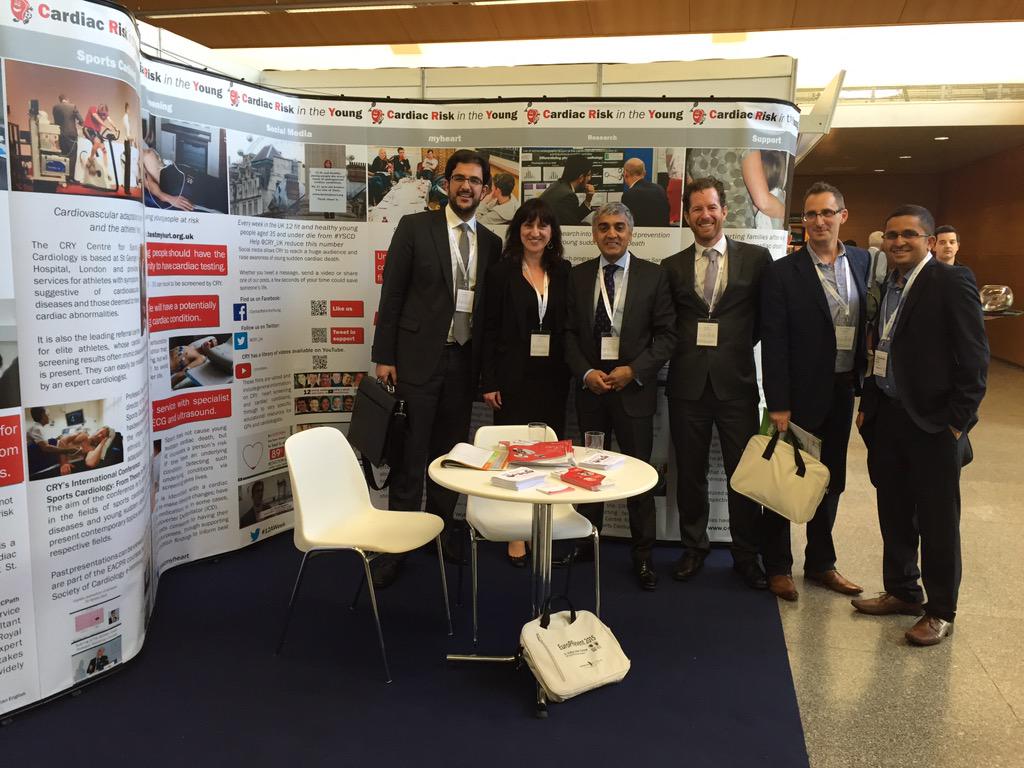
“As a CRY Screening Doctor, you hear such terribly sad stories of tragic – yet often preventable – deaths and this was obviously a difficult part of the job. However, it was also inspiring when you saw how bereaved families were turning these tragedies into opportunities to prevent other deaths in young people, bringing family members and wider communities together in the process. It was touching and humbling and I will always hold so much respect for CRY’s families.
“The research that I was involved with – and the impact this had on the future development of ‘refining’ of CRY’s screening programme – was hugely important to both me and the wider scientific community.
“However, with this opportunity to reflect on the unique legacy of a CRY Research Fellowship, I really do now believe that my three years of additional training and learning played a huge role in me becoming a leading Consultant in this specialist area of cardiology, taking on high profile patient and public engagement roles and ultimately setting up a regional centre for Inherited Cardiac Conditions, serving thousands of patients and their families across the Midlands.
“So yes, in conclusion my CRY Research Fellowship – from published papers, professional development to the people I met – was a truly wonderful experience.”


